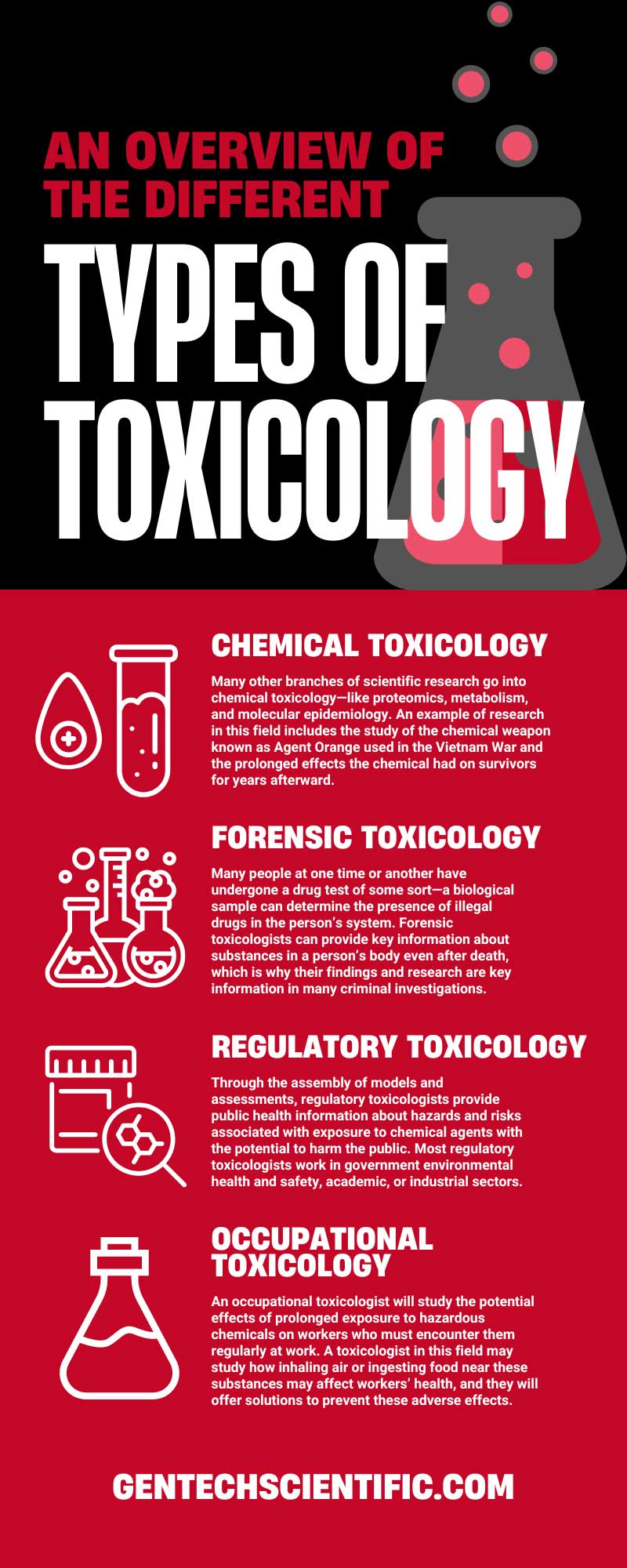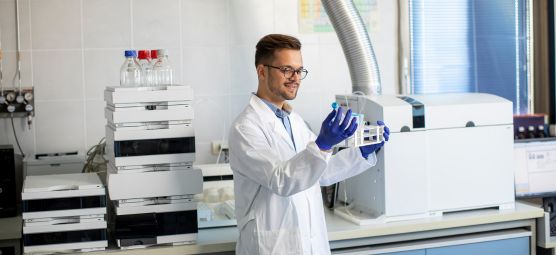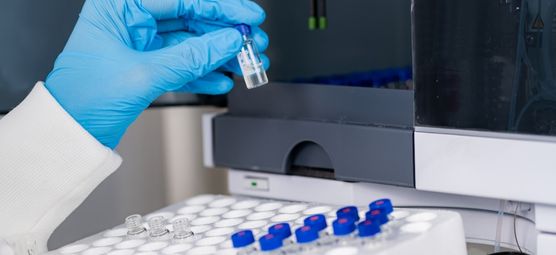Toxicology is a branch of scientific research that includes many different specialties. In our overview, we’ll take a closer look at the many different types of toxicology research, from forensic to aquatic toxicology.
What Is Toxicology?
First, we must learn what toxicology refers to as a branch of science. In general terms, toxicology studies chemical properties and their effects on living organisms—from humans to plant and animal life.
Toxicology is concerned with the adverse effects of chemicals on living organisms. In other terms, toxicology investigates poisons and contaminants, and professionals in the field research the properties of that poison, its effects, treatment, and potential solutions and regulation.
Within this large umbrella of scientific study are many subspecialties that deal with various chemicals, environments, and living organisms.
What’s the Difference Between Toxicology and Pharmacology?
Toxicology and pharmacology seem quite similar, and people outside the fields of study mistakenly use the terms interchangeably. However, there are key differences between the two. Pharmacology focuses on the therapeutic effects of substances and chemicals for medical purposes.
Toxicology is more interested in the adverse effects these substances and chemicals have on humans and other living organisms. Toxicologists are concerned with the risk assessment of substances, while pharmacologists search for positive solutions.
The Different Types of Toxicology
As we mentioned, toxicology is a wide branch of study filled with numerous specialties—all with some similarities but many differences. Below, you’ll find some common toxicology specialties, but keep in mind that this list doesn’t contain every branch of research in toxicology.
Chemical Toxicology
Chemical toxicology focuses on the structure of chemical agents and how they affect living organisms. This sector of toxicology aims to identify adverse health effects from unintentional exposure to chemicals like environmental pollutants.
Many other branches of scientific research go into chemical toxicology—like proteomics, metabolism, and molecular epidemiology. An example of research in this field includes the study of the chemical weapon known as Agent Orange used in the Vietnam War and the prolonged effects the chemical had on survivors for years afterward.
Forensic Toxicology
The average person with little knowledge of toxicology is likely most familiar with forensic toxicology. Forensic toxicology analyses biological samples to identify and quantify the presence of toxins and drugs.
Many people at one time or another have undergone a drug test of some sort—a biological sample can determine the presence of illegal drugs in the person’s system. Forensic toxicologists can provide key information about substances in a person’s body even after death, which is why their findings and research are key information in many criminal investigations.
Regulatory Toxicology
Regulatory toxicology is primarily concerned with large-scale research and data evaluation for regulatory health concerns. Professionals in this sector collect, process, and evaluate data to produce toxicologically based decisions on protecting human health against chemical substances.
Through the assembly of models and assessments, regulatory toxicologists provide public health information about hazards and risks associated with exposure to chemical agents with the potential to harm the public. Most regulatory toxicologists work in government environmental health and safety, academic, or industrial sectors.
Occupational Toxicology
A regular person may encounter potentially harmful chemicals in many places, but an industrial workplace is an obvious place to consider. Occupation toxicology applies the principles of toxicology toward chemical and biological hazards in the workplace.
An occupational toxicologist will study the potential effects of prolonged exposure to hazardous chemicals on workers who must encounter them regularly at work. A toxicologist in this field may study how inhaling air or ingesting food near these substances may affect workers’ health, and they will offer solutions to prevent these adverse effects.
Clinical Toxicology
Clinical toxicology is about the direct application of research to an individual patient rather than the overall research of toxins in humans. Clinical toxicologists may assess patients to diagnose them, assess toxin severity, and provide a long-term prognosis or treatment.
Clinical toxicologists still research the prevention and treatment of diseases caused by chemicals and toxins, but this field of study has a more direct approach to an individual. Researchers in this field study new methods for determining pollutants and chemicals in the body to prevent or reduce adverse effects and diagnose the toxin and dosage quicker.
Environmental Toxicology
As we’ve discussed, toxicology isn’t strictly confined to studying toxins in humans. It studies other living organisms and the environment. Environmental toxicologists research how chemicals, such as air pollution, affect the environment and human health.
Environmental toxicologists are also interested in the movements of chemicals throughout the environment—understanding where they go, how they wound up there, and how they may enter our bodies and harm us. For instance, they may study how air pollution in certain areas may have long-term adverse effects on the population, from lung to brain health.
Veterinary Toxicology
Veterinary toxicology aims to research the existence of toxins and poisonous chemicals in wildlife, livestock, and pets. Suppose a farmer discovers many of their livestock are ill and dying for unknown reasons. In that case, a veterinary toxicologist may be able to pinpoint a toxin present in the animals that originated from a poisonous plant or a contaminated water supply.
Veterinary toxicologists also investigate contamination in mass-produced animal feed that can affect thousands or even millions of animals across the country. Veterinary toxicologists generally research large numbers of animals and attempt to trace the source of these toxins to understand their origins and how to prevent further exposure.
Aquatic Toxicology
As many of us know, aquatic pollution is a severe problem in many parts of the world. Aquatic toxicologists analyze the adverse effects of contaminants and pollution from chemicals on marine organisms and environments.
An aquatic toxicologist may assess the condition of an aquatic ecosystem and monitor those conditions over time. They will observe the growth of potential toxins in the environment and their effects on organisms. Toxicologists in this sector must study the effects of pollutants on many scales, as marine systems are rife with thousands of species—each responding to contaminants in different ways.
Conclusion
Our brief overview didn’t get to other types of toxicology, but rest assured! There are plenty more avenues of research! If you’re interested in starting a toxicology lab, GenTech scientific has the toxicology lab equipment you need.
Contact our staff with questions about our toxicology equipment or to learn more about our services!








